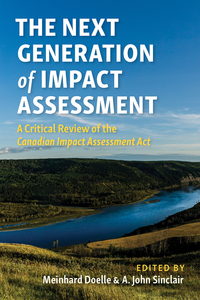
The Next Generation of Impact Assessment
A Critical Review of the Canadian Impact Assessment Act
A. John Sinclair
Meinhard Doelle
Legislated impact assessment requirements were first introduced over fifty years ago with the National Environmental Policy Act in the United States and have since spread to over a hundred and fifty jurisdictions around the world. The details have varied widely, reflecting the global diversity of socio-ecological and governance systems and associated issues, traditions, capacities, ambitions, and power structures. In 2015, Canada embarked on a task that no other country has attempted in recent years: fundamentally reconsidering how best to tackle environmental assessment. This review and revision process ended with the passage of the Impact Assessment Act (IAA) in 2019.
The Next Generation of Impact Assessment explores the evolution of the Canadian assessment process and evaluates the effectiveness of the IAA. Each chapter provides an in-depth analysis of the Act in regard to:
- the contents of the IAA
- regulations and guidance
- an assessment of these provisions based on the literature
- best practices related to the essential elements of impact assessment and federal government commitments made
- establishing any action needed to ensure effective implementation of the IAA
The book also investigates areas of concern for implementation of the Act and proposes areas of further reform. The authors apply their expertise by providing a comprehensive and detailed examination of various sections and provisions while considering essential components that should be included in the next generation of assessment law and policy. The authors conclude that the IAA has the potential to one day symbolize a breakthrough in the federal assessment process, and this text is an invaluable resource dedicated to the successful implementation of the Act and to its continuous improvement.
Book details
-
Publisher
-
Original text
Yes -
Language
English -
Publication date
-
Page count
614 -
Contributions author
-
Edited by
-
Theme
About the author
A. John Sinclair
A. John Sinclair is a professor and the director of the Natural Resources Institute, University of Manitoba. His main research interest focuses on governance and learning as they relate to resource and environmental decision making. He has been very active over the last twenty-five years in relation to environmental assessment law and policy. Through current research grants, he is considering the role of learning in meaningful participation, best approaches for incorporating climate change considerations in assessment, and the elements of next-generation assessment. John has been a member of the Canadian Environmental Network’s Environmental Planning and Assessment Caucus for many years and was also a member of the Canadian Environmental Assessment Agency’s Regulatory Advisory Committee, advisory to the Canadian Environmental Assessment Agency and then minister of environment and the recent Multi-Interest Advisory Committee, on federal assessment process reform and advisory to the minister of environment and climate change.
Meinhard Doelle
Meinhard Doelle is a professor of law at the Schulich School of Law, Dalhousie University, where he serves as Associate Dean, Graduate Studies. He was the Canadian Chair at the World Maritime University from 2019 to 2021. Meinhard served as a policy advisor to the federal government during the development of the Canadian Environmental Assessment Act and as a member of the Regulatory Advisory Committee, advisory to the Canadian Environmental Assessment Agency and then minister of the environment. He co-chaired the Tidal Energy Strategic Environmental Assessment in 2007, served on the Lower Churchill Joint Federal–Provincial Review Panel from 2009 to 2011, and co-chaired the Nova Scotia panel on aquaculture from 2013 to 2014. He currently serves on the Technical Advisory Committee for the new federal Impact Assessment Act in Canada. Meinhard has written on a variety of environmental law topics, including climate change, energy, invasive species, environmental assessments, and public participation in environmental decision making.






